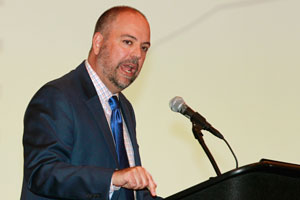ATA's Bob Costello: Better Year in Store for Trucking

NASHVILLE, Tenn. — After the trucking industry endured what he termed “a freight recession” last year, American Trucking Associations' chief economist, Bob Costello, predicts a rosier 2017.
“The economy is growing a little faster. … I think this year will be better for the industry,” Costello said Feb. 23 at the 14th Annual Recruitment and Retention Conference here. “We’re going to need all the drivers we can get.”
While Costello said the industry was short 48,000 drivers when he last fully examined the numbers in the fall of 2015, he said that figure could soar to 175,000 by 2024.
“If we get there, our economy is in a lot of trouble,” Costello said.
However, he less dramatically pegged the likely need at 89,000 drivers a year for the next 10 years at a time when the average driver is 49 years old and thus closer to retirement than the start of his career. That 890,000 figure equals about 25% of the current driver workforce, which Costello expects, even as he predicts trucking’s tonnage share to slip to 66% from 70%.
Costello expects the expansion of the U.S. economy, the third-longest since 1970, will continue this year, predicting that growth, which was just 1.6% in 2016, will rise to 2.3% this year and 2.7% in 2018.
“We’re getting closer and closer to full employment, which makes it a little more difficult to find drivers,” Costello said, adding that the rate of unemployed people per job opening has sunk to 1.4 today from nearly 7 in 2009.
Costello also forecasts the turnover rate in the truckload sector, which was down between 80-84% in 2016, to rise this year.
On the positive side, Costello said the industry is “finally clearing out” the excess inventory in the supply chain.
“At the same time we had a freight recession, we bought too many trucks,” he said.
On a more controversial note, Costello criticized President Trump’s highly touted hopes of reworking the North American Free Trade Agreement with Canada and Mexico.
“Trade and trucking are synonymous,” Costello said. “Let’s not blow up Nafta.”
He then quoted an unidentified fellow economist as saying, “Fear microchips, not Mexicans.”
Along that theme of technology costing more American jobs than competition from cheap foreign labor, Costello said that U.S. factory output is up 75% since 1990, but employment in that sector is down 31%. Automation actually benefits trucking because all those products need to be delivered, and those laid-off factory workers can help solve the driver shortage.
In contrast, Costello said the mandatory installation of electronic logging devices by December in all trucks — most of which don’t have them now — will reduce productivity by limiting the number of miles driven because hours-of-service limits will be impossible to evade.
He said 2-3% of carriers and drivers might be so resistant to ELDs that they’ll leave the industry.

